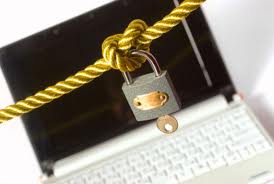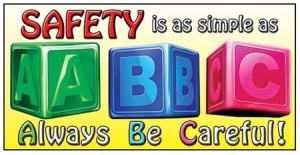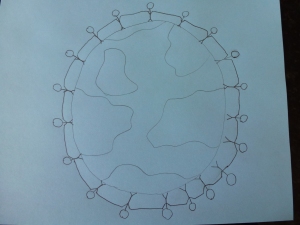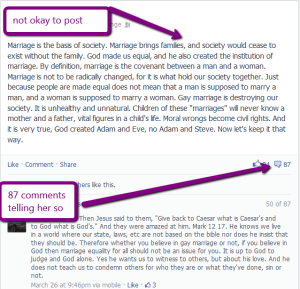This blog post is all about reflecting on the work I did for my Intro to Writing Arts course. I begin with an explanation of one of my PechaKucha slides. Afterword, there’s a section where I write about all the things I learned about etiquette on the web throughout my blogging experience. Enjoy!
A Walk Through A Slide
My section as a whole was about how proper etiquette on the internet is about being yourself. I talked about how this is easier to do online when you’re behind a screen, and how we become braver and more honest. Although I mentioned the darker aspects of this, I mainly wanted to focus on how this freedom and expectation to be who we are can be a good thing. My fourth slide especially talks about this. It’s all about the new communities being built on the web based off common interests. This is why I bring in Kelly’s “We are the Web,” which speaks in great detail about the way most of the content on the web is created by us. We are free to be ourselves and find others who are like us. We can create friendships that last for years while also realizing that maybe there’s a place for us to fit in after all. I also brought up that although we should be ourselves, the concept of our identity is much looser on the internet. As I said in my presentation, I can be Sarah the college student and Sarah the fairy princess zombie huntress and both can be “me” depending on where I am. Are the things I have a character say in a role-playing game any less real than the status updates I post on Facebook? Both are an image I am trying to create and maintain–one is just significantly less entertaining.
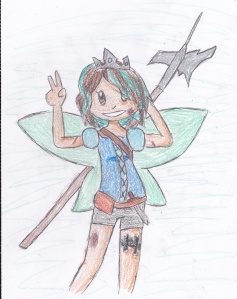 That “self-portrait” I drew obviously is meant to portray me being a faerie princess zombie huntress (I really love typing that out–it’s just so ridiculous). But it’s more than that. It’s a symbol of the imagination we are allowed to express and the worlds we can create for ourselves and others. These worlds have their own sets of rules and etiquette within them, and it’s an amazing thing. We no longer have to take a trip to the library or the bookstore to go to different places–though I definitely still recommend it–we can go on the web and create them ourselves building with others new magical places. Of course, it’s still important to follow the rules we make for ourselves. We can’t have our worlds descend into chaos, can we? (Unless that’s what you want them to do). This very act of creation is what fits so well with “We are the Web.”
That “self-portrait” I drew obviously is meant to portray me being a faerie princess zombie huntress (I really love typing that out–it’s just so ridiculous). But it’s more than that. It’s a symbol of the imagination we are allowed to express and the worlds we can create for ourselves and others. These worlds have their own sets of rules and etiquette within them, and it’s an amazing thing. We no longer have to take a trip to the library or the bookstore to go to different places–though I definitely still recommend it–we can go on the web and create them ourselves building with others new magical places. Of course, it’s still important to follow the rules we make for ourselves. We can’t have our worlds descend into chaos, can we? (Unless that’s what you want them to do). This very act of creation is what fits so well with “We are the Web.”
What I Learned About My Blog Topic
I’ve obviously thought about etiquette before, and I know that it’s one part of the web that can use some fine-tuning. I hadn’t, however, thought very hard about it on my own before this blog assignment. Mostly it was getting annoyed at hateful comments on the internet or cringing when I see Facebook posts that are outside of the unwritten code of conduct, like when you can tell people clicked the wrong link and now their account is spamming everyone on their friends list, bless their poor little hearts. I don’t know if blogging about “netiquette” and researching it taught me something new. It was more like it made me think about it in new ways. I made connections with the readings for class. Atwood’s blog post, for example, made me think about how etiquette online is way different than it is offline, and in some ways it’s better. The readings “We are the Web,” “What is Web 2.0,” and “An Anthropological Introduction to Youtube” all made me realize that netiquette isn’t something defined by the creators of beg websites. Don’t get me wrong, websites have terms of service that allow them to take action against rule-breakers, but those only go so far—especially since nobody reads them. For the most part, the ones who create and enforce these codes of conduct are us. We support and we punish.
On the other hand, these readings and my own reminded me that not everything online is unicorns and rainbow magic. “A Rape in Cyberspace” reminds us that people take advantage of the freedom and anonymity on the web and use it to hurt others. In an article I found on Cracked.com, Felix Clay writes about how society has decided it’s pretty much okay to act like jerks on the internet. I never considered this; mostly, I thought there were rules and some people just chose to ignore them and everyone else hated those people. But that article made me thing, hey, maybe the mean terrible things on the internet are a part of netiquette. Maybe we let this happen and now we’re dealing with the consequences. Still, I have hope: not everyone on the web is a jerk. There are those of us who know how to act online and even though we might not be as loud (obnoxious) we are still there.
